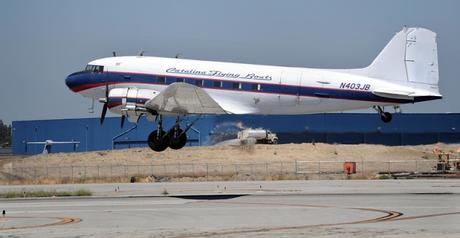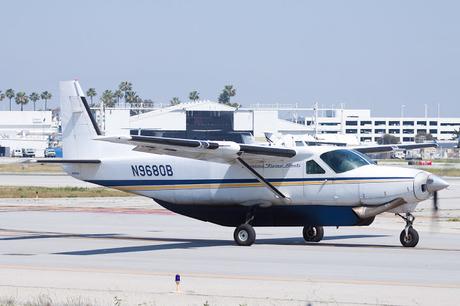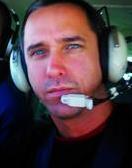
As first reported in the Press-Telegram:One of Catalina Flying Boats’ historic DC-3 aircraft flew over Long Beach Airport Wednesday afternoon for what amounted to an aerial farewell before its final departure.The company, which hauls mail and other cargo from Long Beach to Catalina on a near-daily basis, has traded its DC-3s for a pair of single-engine turboprop Cessna Caravan planes that are more reliable and less expensive to maintain. Yet as much as the switch makes sense from a business perspective, the old DC-3s are going to be missed.

“That was brutal,” Catalina Flying Boats pilot James “JAD” Davy said after piloting one of the company’s DC-3s over Long Beach Airport, to the enjoyment of a small gathering of aviation enthusiasts who gathered in a nearby parking lot near the airport’s edge to watch the flyby.Davy has flown DC-3s for Catalina Flying Boats since 1992, and he said it has been an honor to have been behind the controls of a historic aircraft.“Not too many people get to do it,” he said.
An Honorable History
The National Air and Space Museum calls the DC-3 “the most successful airliner in the formative years of air transportation.” The aircraft’s flying history dates back to 1935 and workers assembled more than 13,000 DC-3s over the course of its production runs
Douglas Aircraft Co. workers assembled DC-3 aircraft at manufacturing plants in Long Beach and Santa Monica. Boeing Co., the corporate inheritor of Douglas Aircraft’s legacy, credits the DC-3 with making commercial aviation a profitable enterprise. Its account of the aircraft’s history, however, shows the vast majority of DC-3s — nearly 10,200 planes — were built for military service. The U.S. Army Air Forces designated the aircraft as the C-47 Skytrain, although the Air Mobility Command Museum relates that some who served during World War II had their own nickname for the aircraft — the “Gooney Bird.”Whatever one calls the DC-3, the Allies employed the aircraft to bring cargo, paratroopers and glider-borne infantry to the front lines.The backdrop of history perhaps explains why some pilots who watched Davy’s short flight over Long Beach on Wednesday expressed sentimental feelings after watching the old plane in the air.“It’s nostalgic. Takes you back to an era that I wish I was in, but I was born 30 years too late,” said Vasco Rodrigues, a 56-year-old United Airlines pilot living in Signal Hill.Keep FlyingCatalina Flying Boats traces the history of one of its DC-3s to 1944 and the other’s to 1945. The military made use of both planes before their eventual arrival in Long Beach.The freight company itself has been in existence since 1984, and started out with a Grumman Goose seaplane. Its fleet has also included a De Havilland Canada Otter and Beechcraft Model 18.The DC-3s are headed to Ohio for a $3 million overhaul, according to the company. They are scheduled to remain in service half a world away flying cargo to difficult-to-access places in Africa.
CaravanNation.com

